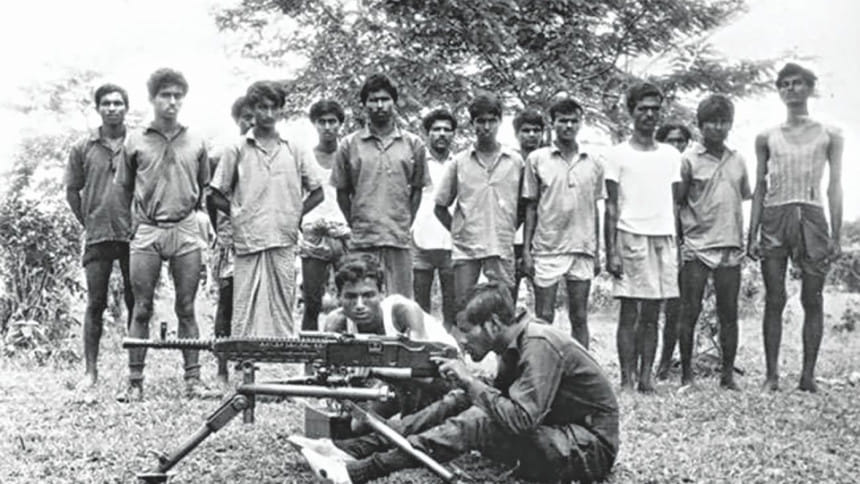Operation Searchlight in the national self-determination narrative

In international law, the self determination narrative of Bangladesh stands as an exception (especially considering this to be the only successful case of secession by force between the WWII and the end of cold war). The praxis of international law of self determination, as observed by Antonio Cassese, is diverse and full of highly contentious issues. There is in fact a growing consensus among States and jurists, as to the non-applicability of the right to self determination in contexts beyond colonial domination. The right (which is frequently referred in modern parlance as a doctrine to legitimise independence of a State) therefore, remains with antagonistic ideals and by the same token, is full of uncertainties. This makes it difficult to exactly predict, or, produce an aspired outcome from any particular self-determination narrative (which may range from autonomy to independence). It is noteworthy that the independence of Bangladesh is a glaring exception to these rules, serves as a great hope to the oppressed peoples of different parts of the world. Further, in all plausible senses, Bangladesh (later followed by Bosnia and Herzegovina, East Timor, South Sudan and Kosovo) provided completely separate sets of apologetic bases, for any people to legitimately claim independence, even beyond a colonial setup.
Self-determination being a partly legal and partly political norm, can be maneuvered, influenced or, legitimised (even often predominantly) by political or, factual events. Hence, political legitimacy (which often plays a key role in establishing a claim for an independent State, or, conversely, delegitimising an existing State) is vital substantially (if not exhaustively) for any such narrative. It is submitted that the birth of Bangladesh is marked by a number of political and military events (with logically clear and unambiguous political consequences) that significantly and rapidly adds legitimacy to the claims of Bangalees' to have an independent State. One such event, which is still internationally unrecognised (and academically under-researched), but provides logical and legal premises for our claims to establish a separate State, is the infamous Operation Searchlight.
On 25th March 1971, the Pakistan army launched the operation against the peoples of this land. In Mizanur Rahman Khan's '1971: Secret Documents of USA' the reason behind the attack of 25th March, as identified by CIA, was to destroy Awami League and to bring quick and effective control on the East Bengal. In a confidential telegram of then Consul General Blood to Washington, he wrote: Here in Dacca we are mute and horrified witnesses to a reign of terror by the Pak military. Evidence continue to mount that the military authorities have a list of Awami League supporters whom they are systematically eliminating by seeking them out in their homes and shooting them down. This confidential document of a pro-Pakistan (US) consular mission (in Dhaka) clearly signals the gravity and magnitude of the genocide occurred.
The truth of the statement was endorsed (though in varying degrees) by a number of top ranking army commanders of the then Pakistan army in Bengal. To mention, General Amir Abdullah Khan Niazi, who wrote “The Betrayal of East Pakistan” mentioned in his book that one of the key players of the operation “Major Gen Rao Farman had written in his table diary, 'Green land of East Pakistan will be painted red'. It was painted red by Bengali blood.” The evidence and witness narratives regarding the occurrence of a massive genocide in this land on the 25 March 1971 and in the following days, is widely available, highly credible and legally useful.
Convention on the Prevention and Punishment of the Crime of Genocide, 1948 in Article II says: genocide means any of the following acts committed with intent to destroy, in whole or in part, a national, ethnical, racial or religious group, as such: (a) Killing members of the group; (b) Causing serious bodily or mental harm to members of the group; (c) Deliberately inflicting on the group conditions of life calculated to bring about its physical destruction in whole or in part; (d) Imposing measures intended to prevent births within the group; (e) Forcibly transferring children of the group to another group. The military crackdown of 25th March categorically satisfies more than one of the criteria mentioned in the list.
The 25th March genocide despite its (internationally) unrecognised status is a central part of the history of liberation war of Bangladesh. Understandably, it gave a mammoth impetus in our liberation movement and inspired an armed struggle against the Pakistan army. More importantly, it provided a legal and logical tool for the nation which suffices as a defense of armed resistance. Genocide is often referred as the extreme denial of right to self determination. Conversely, as a logical parallel, it may be imagined that every genocide adds legitimacy to the claims of right to self determination. This may be endorsed by the fact that a number of international persons that are arguably more or, less successful in attaining Statehood (beyond colonial domination) defying the principle of uti possedetis and territorial integrity, all are allegedly victims of genocide. In simpler terms, there is a growing trend in State practices which is mostly political (and less legal) to consider genocide as a vital fact to add political legitimacy to the pleas of Statehood, as for examples, in cases of Bosnia and Herzegovina, East Timor, South Sudan and also in case of Kosovo. However, this does not mean that genocide (even if it is proven) alone suffice to establish the legitimacy of an independent State. In practice, the gross human rights violations and mass murders of innocent beings in some cases stand as a convincing apologia in the negotiation tables.
Bangladesh, in 1971 was the victim of recurrent genocides (killing millions of peoples) which were predominantly started following the operation searchlight. However, during the post-independent regimes, a persistent inertia was shown by the State to attain international recognition of these terrible crimes. It is optimistic to see that an effort is being initiated by the spearheads of the State to bring international recognition to the genocides occurred in this land during 1971. It will certainly enrich our glorious narrative of a successful right to self determination struggle beyond the colonial paradigm.
The writer is an Assistant Professor, Department of Law, University of Dhaka.

 For all latest news, follow The Daily Star's Google News channel.
For all latest news, follow The Daily Star's Google News channel. 








Comments